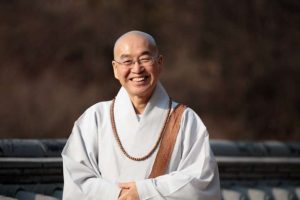
The Catholic Order of Discalced Carmelites and the International Centre of Teresian and Sanjuanist Studies (CITeS) of Ávila, Spain, recently hosted the “3rd World Encounter of Teresian Mysticism and Interreligious Dialogue: Tibetan Buddhism and Carmelite Spirituality.” The conference, held in cooperation with the Centre of Buddhist Studies (CBS) at the University of Hong Kong (HKU) and the Fundación Dharma-Gaia, was held on 25–28 July in Ávila before an audience of 50–100 in-person participants and a global audience via live-stream.
The event marked the third collaboration between CITeS and CBS. The inaugural event, titled the “1st World Encounter of Teresian Mysticism and Interreligious Dialogue: Theravāda Buddhism and Teresian Mysticism,” took place from 27–30 July 2017. Due to its success, a second forum was organized to bring together the Discalced Carmelites and the Chan/Zen school of Buddhism, focusing on cultivating love and compassion. Originally set for 22–26 July 2020, this event was postponed and eventually canceled due to the COVID-19 pandemic.
As noted in the event announcement:
Carmelite mysticism and Buddhist mysticism have developed over the centuries as two distinct ways of lived spirituality. The general theme for this meeting is to explore the role of visionary revelation in the pursuit of wisdom. Visualizing, contemplating, and encountering the deity are essential practices in the Carmelite tradition and in Tibetan Buddhism. These practices help foster spiritual growth and deepen the practitioner’s relationship with “the sacred.”
(Universidad de la Mistica – CITeS)
The conference was intended to explore shared elements and differences in Carmelite and Tibetan Buddhist practices. Both traditions emphasize the importance of morality, prayer, and contemplation as means of attaining union with the ultimate. The Carmelite mystic seeks union with God through self-knowledge and the person of Jesus Christ, involving loving attention and readiness for divine presence. In contrast, Buddhist mystics aim for awakening through compassion and wisdom. Both traditions value discipline, contemplative practices, purification for transcending ego limitations, and the role of suffering in spiritual development.
The event facilitated genuine dialogue and collaboration, promoting paths of wisdom for a compassionate and harmonious world. This spirit of equality, mutual respect, and curiosity underpins the initiative.
In his introductory remarks at the conference, Georgios Halkias, director of the CBS at HKU, emphasized that Tibetan Buddhism and Catholicism were not monolithic entities, nor was either stuck in time. Instead, both were growing and changing continuously. As such, encounters such as this provided ground for people from both traditions to exercise skillful communication and deeper discernment.
Quoting from the Kalama Sutta, in which the Buddha advises a group of people curious about his teachings, Halkias said: “If the teachings bring about peace, then they should be considered worthy.”
CITeS director Jerzy Nawojowski OCD highlighted the importance of inter-religious dialogue, noting, “We have a very vague idea, if not non-existent, of Buddhism. However, it is an ancient culture and religion that has millions of followers and has been fundamental for human development and the functioning of many societies. Without a doubt, as the Second Vatican Council assured us, there are seeds of truth in it too, and we want to know this truth.” (Religión Digital)
Nawojowski emphasized the importance of mutual knowledge and understanding in today’s multicultural Western societies, stating, “We want to facilitate a genuine and respectful exchange between the two traditions, highlighting both similarities and differences, in order to enrich the spiritual and religious understanding of all participants.” (Religión Digital)
When asked what Teresian mysticism might have to offer to Buddhists, Nawojowski responded: “I believe that the unwavering commitment to the reality of everyday life, the interest in the current and complex situation of the world, of society, but as a loving fruit of prayer.” (Religión Digital)
During the conference, participants engaged in religious practices and rites of both traditions to better understand one another. This approach aimed to promote a compassionate and harmonious gathering, sharing knowledge and practices that can contribute to peaceful coexistence between different religions and cultures.
Participants from diverse backgrounds, including two Buddhist nuns from Bhutan, attended the event, enriching the dialogue with their perspectives. The presence of participants from 15–20 nationalities at CITeS highlighted the event’s global draw for people committed to spiritual education.

Other leading academics from CBS in Hong Kong included assistant Prof. Catherine Hardie, Prof. Klaus-Dieter Mathes, and honorary lecturer Phuntsok Wangchuk. Khenpo Yeshi, a PhD candidate at UC Berkeley University, also presented. Catholic speakers included Saverio Cannistrá, ex-superior general of the Order of Discalced Carmelites, Sister Maria José Pérez, Prof. Juan Antonio Marcos Rodriguez, Father Francisco Brändle, and Prof. Francisco Javier Sancho Fermin.

BDG was represented by Daniel Millet Gil, editor of Buddhistdoor en Español and an organizer of the event, BDG senior writer Raymond Lam, who covered the event thoroughly on the BDG Teahouse blog, and BDG senior correspondent Justin Whitaker, who offered a comparative perspective on the ultimate objective of both Buddhist and Catholic mysticism and moderated the event’s final roundtable discussion.
The conference closed with a renewed commitment to interfaith dialogue, fostering understanding and respect among different religious traditions. As the event concluded, hope for future collaborations and continued learning was evident among all attendees.
By promoting such interreligious encounters, the CBS at HKU, CITeS, and their partners aim to build bridges between diverse spiritual traditions, contributing to a more compassionate and understanding global community.
See more
Jerzy Nawojowski OCD: “If she had met Buddhists, St. Teresa could have learned a lot” (Religión Digital)
3rd World Encounter of Teresian Mysticism and Interreligious Dialogue: Tibetan Buddhism and Carmelite Spirituality, conference program (Buddhistdoor en Español)
3rd World Encounter Teresian Mysticism and Interreligious Dialogue (Universidad de la Mistica – CITeS)
International Centre of Teresian and Sanjuanist Studies
The Centre of Buddhist Studies of the University of Hong Kong
Fundación Dharma-Gaia
Related news reports from BDG
Tibetan Buddhism and Carmelite Spirituality to be Featured in Interreligious Encounter in Ávila, Spain 2024
Ahead of Vesak, Catholic Leadership Urges Buddhists to Continue Interfaith Work for Peace
Second Edition of the Buddhist Film Festival of Catalonia, Spain to be Held in October 2024
Carmelite and Chan/Zen Interfaith Conference to Be Held in Avila, Spain in July 2020
Chan/Zen Buddhism and Carmelite Spirituality, Interreligious Encounter in Ávila, Spain, July 2020
Related features from BDG
Tibetan Buddhism and Carmelite Spirituality: An Inter-religious Meeting in Ávila, July 2024
Interactive Dialogue on Theravada Meditation and Carmelite Mystic Prayer in Avila
Related Blog Posts from BDG Tea House
Faith and Flamenco
The Mandala and the Mansion
Beyond mere goodwill: Keeping authenticity in interfaith dialogues in Avila
















